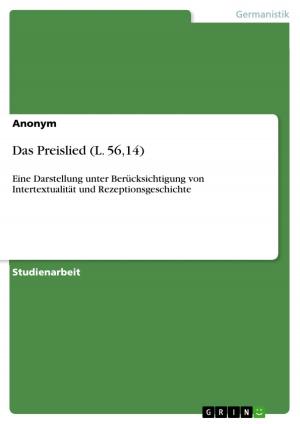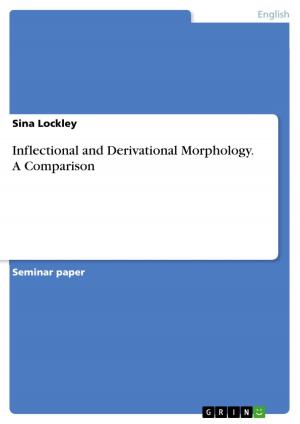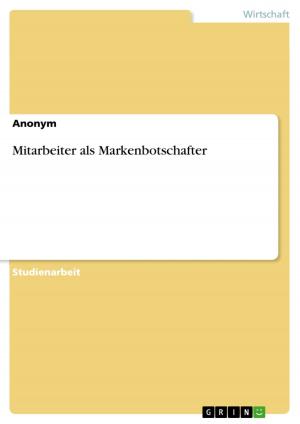The Use of Scots and their archaisms and their dramatic funtion
A comparison between Liz Lochhead´s 'Mary Queen of Scots got her head choped off' and Duncan McLean´s 'Julie Allardyce'
Fiction & Literature, Literary Theory & Criticism, British| Author: | Kevin Theinl | ISBN: | 9783656017431 |
| Publisher: | GRIN Verlag | Publication: | September 28, 2011 |
| Imprint: | GRIN Verlag | Language: | English |
| Author: | Kevin Theinl |
| ISBN: | 9783656017431 |
| Publisher: | GRIN Verlag |
| Publication: | September 28, 2011 |
| Imprint: | GRIN Verlag |
| Language: | English |
Essay from the year 2010 in the subject English Language and Literature Studies - Literature, grade: 2,0, University of Rostock, language: English, abstract: The Scots language has to be enriched, so old vocabulary must resurrect. That includes the usage of internal borrowings. Archaic Scots lexis is used differently from play to play and I will examine the quantitative differences and literary effects, which arise from the lexis, on the basis of two modern Scottish theatre plays. A drama is more qualified for an analysis of potential forms and functions of Scots than other sorts of texts. A more particular multifaceted usage of Scots is expected in a drama, because Scots is not a standardized form of speech and it is much more used in informally spoken language. The term 'Scots' refers principally to the forms of speech in the Scottish lowlands, but in detail it can describe different things, for example a national language, or a collective of regional dialects or sociolects of the English language. These different dialects share a mutual distance to English, but are close to each other. Scots lasts until today as a spoken language particularly in the lower social classes, even if it was tried to anglicize Scots and to banish that language. In the florescence of enlightenment the pronunciation became a status symbol and so a list of all scottisisms was published to force the Scottish people to rectify their language. This essay deals with functions of Scots in a drama and the corpus of two modern Scottish theatre plays and the use of Scots and also Scots archaisms and their dramatic function within the plays. At first, I have chosen Liz Lochhead´s 'Mary Queen of Scots got her head chopped off' and secondly Duncan McLean´s 'Julie Allardyce' which I want to compare on the basis of quantitative differences in the usage of Scots types and the degree of obsolescence.
Essay from the year 2010 in the subject English Language and Literature Studies - Literature, grade: 2,0, University of Rostock, language: English, abstract: The Scots language has to be enriched, so old vocabulary must resurrect. That includes the usage of internal borrowings. Archaic Scots lexis is used differently from play to play and I will examine the quantitative differences and literary effects, which arise from the lexis, on the basis of two modern Scottish theatre plays. A drama is more qualified for an analysis of potential forms and functions of Scots than other sorts of texts. A more particular multifaceted usage of Scots is expected in a drama, because Scots is not a standardized form of speech and it is much more used in informally spoken language. The term 'Scots' refers principally to the forms of speech in the Scottish lowlands, but in detail it can describe different things, for example a national language, or a collective of regional dialects or sociolects of the English language. These different dialects share a mutual distance to English, but are close to each other. Scots lasts until today as a spoken language particularly in the lower social classes, even if it was tried to anglicize Scots and to banish that language. In the florescence of enlightenment the pronunciation became a status symbol and so a list of all scottisisms was published to force the Scottish people to rectify their language. This essay deals with functions of Scots in a drama and the corpus of two modern Scottish theatre plays and the use of Scots and also Scots archaisms and their dramatic function within the plays. At first, I have chosen Liz Lochhead´s 'Mary Queen of Scots got her head chopped off' and secondly Duncan McLean´s 'Julie Allardyce' which I want to compare on the basis of quantitative differences in the usage of Scots types and the degree of obsolescence.















